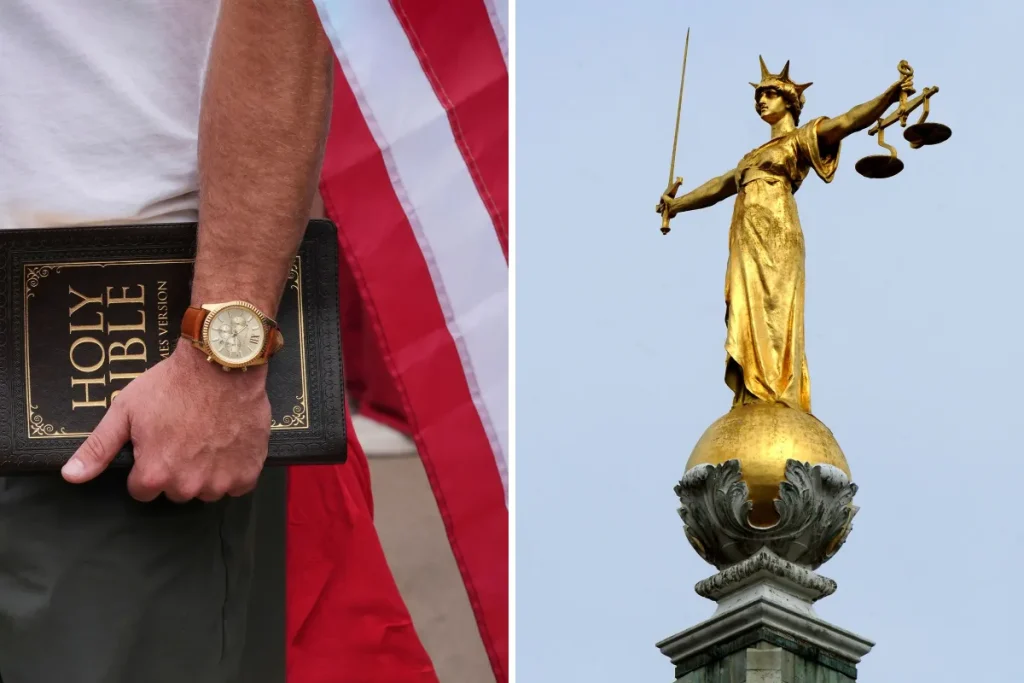A Mother’s Right to Share Her Faith: Maine Court Weighs Religious Freedom in Custody Dispute
The Case at the Heart of a Constitutional Debate
The Maine Supreme Judicial Court is deliberating a case that strikes at the foundation of religious liberty and parental rights in America. Emily Bickford, a mother from Maine, is fighting a custody order that prevents her from taking her 12-year-old daughter to church or sharing Bible teachings with her. This unusual and sweeping restriction came from a Portland District Court ruling in December 2024, which granted the child’s father, Matthew Bradeen, exclusive control over all religious decisions concerning their daughter. The lower court determined that teachings and imagery at Calvary Chapel in Portland—including depictions of “fallen angels” and messages about “eternal suffering”—had caused psychological distress to the child. This led to a judicial finding that continued exposure to such teachings risked “psychological harm.” Now, as the state’s highest court considers the appeal, the stakes couldn’t be higher for parents across the nation whose faith forms an integral part of their relationship with their children.
Constitutional Questions and Parental Authority
At oral arguments in November 2025, Emily Bickford’s attorney, Mathew Staver, passionately argued that the restrictions violate constitutional principles by imposing what he called a “total veto” on the mother’s ability to engage in religious education with her daughter. He emphasized that the court’s findings fell dramatically short of the constitutional threshold needed to restrict such fundamental rights: “There is no finding of abuse or neglect,” he stated, noting that the evidence showed only that the child “at one time was observed to have anxiety,” once experienced “a panic attack,” left “notes around the house,” and wrote that “this demon image was scary.” Staver insisted these observations “cannot be a compelling interest” sufficient to override parental rights. The attorney further contended the order was extraordinarily broad, effectively giving the father “absolute unreviewable authority” over any religious association, Bible reading, church attendance, or even discussions about religious philosophy. Such sweeping restrictions, he argued, “cannot under any circumstances survive narrow tailoring” required by constitutional standards.
The Father’s Position and Expert Testimony
Matthew Bradeen’s attorney, Michelle King, has defended the lower court’s approach, arguing that the trial judge identified “compelling state interests in avoiding substantial harm” to the child and had carefully tailored the restrictions to address genuine risk. Her position maintains that the court acted within its legal discretion after observing real emotional consequences from the child’s exposure to certain religious teachings. The district court’s decision relied partly on testimony from an expert witness specializing in religious groups and coercive influence—testimony that Bickford’s team characterized as coming from “a blatantly hostile ‘expert'” with questionable neutrality. Nevertheless, the trial court found this testimony credible, concluding that the combination of sermons, imagery, and youth materials at Calvary Chapel had genuinely caused fear and confusion for the young girl. The father’s legal team also raised concerns about trust and co-parenting issues, with King asserting during proceedings that “Ms. Bickford was short of lying… she told Mr. Bradeen they were simply going to the capital when they were going for an abortion rally.”
Justices Probe the Limits of Judicial Authority
During the November hearing, the justices of Maine’s highest court engaged both sides with probing questions about where the boundaries of judicial authority should lie in disputes involving religion. One justice directly asked whether the “best interest of the child” standard—a cornerstone of family law—conflicts with constitutional religious-freedom principles. Staver responded that these standards were “not in tension” but argued that constitutional protections require courts to meet a much higher threshold before restricting a parent’s religious expression with their child. Another justice pressed the attorneys on where lines should be drawn if particular religious practices are alleged to cause harm. Staver acknowledged that limits exist, distinguishing between constitutionally protected religious expression and situations involving physical or sexual abuse, which he conceded would clearly justify court intervention. This exchange highlighted the central challenge facing the court: determining how to balance protecting children from potential harm while respecting the deep constitutional protections afforded to religious practice and parental authority.
The Unprecedented Nature of the Restriction
The sweeping nature of the custody order has drawn attention from legal observers nationwide. Staver characterized the restriction in stark terms during oral arguments: “I’ve never seen in the history of my career an order as hostile as this one… that order reeks with that kind of hostility.” The case is remarkable because courts have historically treated the content of religious teachings with extreme caution, generally avoiding judgments about theological matters. The Maine case breaks from this tradition by evaluating specific religious content and finding it potentially harmful—a position that makes many religious liberty advocates deeply uncomfortable. At its core, the case asks whether a family court judge can determine that mainstream religious teachings themselves—rather than abusive practices done in the name of religion—constitute a psychological danger to a child. This distinction could have far-reaching implications for how courts nationwide approach religious elements in custody disputes.
What Comes Next and Why It Matters
With oral arguments complete, the Maine Supreme Judicial Court has begun private deliberations and will issue a written decision in the coming months that could reshape the landscape of family law and religious liberty. The justices may affirm the order, reverse it entirely, or send the case back for further proceedings with new guidance. Their ruling is expected to clarify how Maine courts—and potentially courts nationwide—should balance parental rights, religious freedom, and claims of psychological harm in custody disputes. The case matters not just to Emily Bickford and her daughter but to countless families across America where parents wish to share their faith with their children even after relationships end. It asks fundamental questions about who decides what religious teachings are appropriate for children: parents or courts? The answer could either reinforce strong constitutional protections for religious parenting or open the door to more extensive judicial review of religious content in family settings. As society continues to navigate the complex intersection of religious diversity, family dynamics, and child welfare, the Maine court’s forthcoming decision will likely serve as a significant legal landmark.














